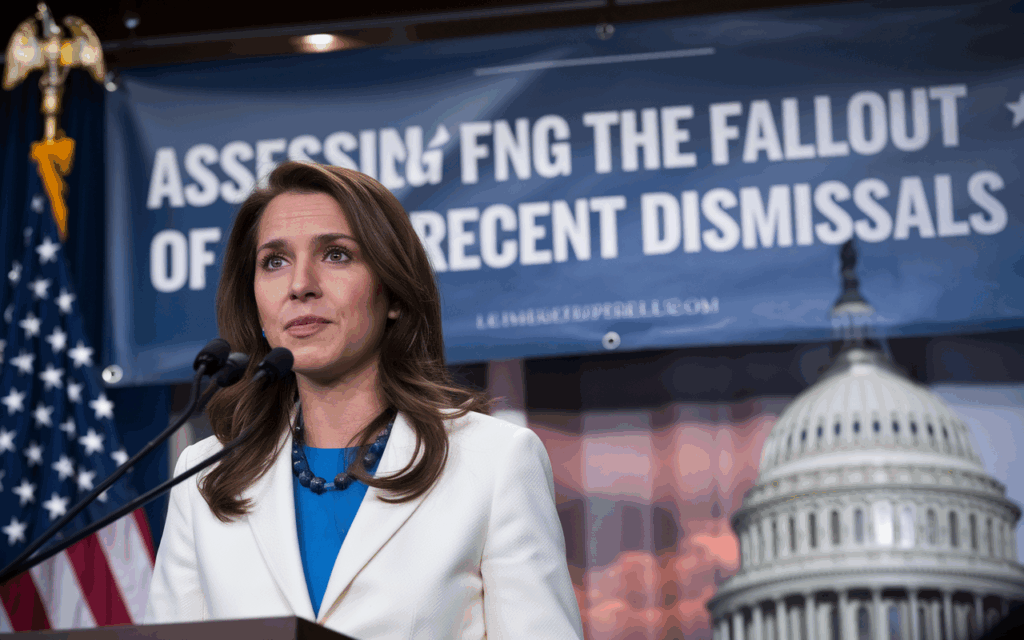Tulsi Gabbard's Bold Moves in Intelligence: A Controversial 'House Cleaning' 🏛️💼
In a surprising shake-up in the intelligence community, Tulsi Gabbard, the newly appointed Director of National Intelligence, has decided to part ways with two top officials from the National Intelligence Council (NIC). This bold decision follows an investigative report that challenged claims made by former President Trump regarding the Venezuelan gang Tren de Aragua and sparked discussions about the political influences within our intelligence agencies. 😲📊
What Happened? 🔍
Just weeks after the NIC published an intelligence report refuting the Trump administration's assertions that the Venezuelan government was orchestrating gang activity against the U.S., Gabbard called for the dismissal of Acting Chair Mike Collins and Deputy Maria Langan-Riekhof. Accusations surfaced, claiming these officials were “radically opposed to Trump” and allegedly undermined the incoming administration.
Gabbard's moves come as she attempts to reposition the NIC from its previous oversight under the CIA to her direct control, aiming to ensure accountability and reduce politicization of intelligence. A considerable portion of her strategy revolves around fostering an environment where truth reigns over allegiance to political figures. 🌐🔒
The Intelligence Report 🕵️♂️📜
The NIC report raised eyebrows by asserting that the Maduro regime in Venezuela likely did not control the activities of Tren de Aragua, countering Trump's narrative that painted the gang as a significant threat conducting warfare against the U.S. This revelation points to a debate about the capacity and motivations driving political narratives in the context of national and foreign security.
The report stated, "The small size of TDA’s cells, its focus on low-skill criminal activities, and its decentralized structure make it highly unlikely that TDA coordinates large volumes of human trafficking or migrant smuggling." This directly clashes with Trump's portrayal, eliciting a questioning of the motivations behind intelligence findings.
Reactions & Implications 🌪️⚖️
The reaction to Gabbard's firings has been mixed, with some applauding her for attempting to cleanse the system of what they view as corrupt or politically biased elements. However, others, including House Intelligence Committee members, flag serious concerns regarding the potential implications of such actions on the integrity of the intelligence workforce. Jim Himes’ remarks suggested fears that job security might now hinge on producing analyses that align with Gabbard and Trump's agenda rather than objective truth.
Gabbard's tenure, though still in its infancy, illustrates the ongoing struggle between intelligence priority and political interference. As we continue to navigate a politically charged environment, her moves could either solidify a new standard for impartiality or set a precedent for further politicized purges within the intelligence community.
A Future to Watch 👀📈
It’s clear that the future direction of intelligence under Gabbard will be a hot topic. Will her approach pave the way for a more transparent and accountable intelligence framework, or will it deepen the divides between political factions? As citizens and observers, staying informed and engaged will be crucial as we witness how these decisions influence our national security narrative.
Let me know your thoughts on this developing story! Do you believe Gabbard's actions are justified? Let's discuss! 🌟💬
Feel free to engage below and share this post! 🔄💖
Tags: #TulsiGabbard #Intelligence ☕

More Stories
Exciting News: The Summer I Turned Pretty is Becoming a Movie
Reflecting on Robert Redford’s Legacy of Integrity and Artistry
Sara Rivers Appeals Dismissal of $60 Million Lawsuit Against Sean Combs: A Fight for Justice in the Entertainment Industry